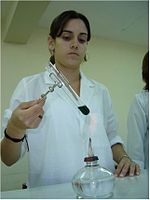Portal:Science
| Main page | Categories & Main topics | Related portals & WikiProjects | Things you can do |
Science is the methodical study of nature including testable explanations and predictions. From classical antiquity through the 19th century, science as a type of knowledge was more closely linked to philosophy than it is now and, in fact, in the Western world, the term "natural philosophy" encompassed fields of study that are today associated with science, such as astronomy, medicine, and physics. However, during the Islamic Golden Age foundations for the scientific method were laid by Ibn al-Haytham in his Book of Optics. While the classification of the material world by the ancient Indians and Greeks into air, earth, fire and water was more philosophical, medieval Middle Easterns used practical, experimental observation to classify materials.
Today, the ever-evolving term "science" refers to the pursuit of knowledge, not the knowledge itself. It is often synonymous with "natural and physical science" and often restricted to those branches of study relating to the phenomena of the material universe and their laws. Although the term implies exclusion of pure mathematics, many university faculties include Mathematics Departments within their Faculty of Science. The dominant sense in ordinary use has a narrower use for the term "science." It developed as a part of science becoming a distinct enterprise of defining the "laws of nature"; early examples include Kepler's laws, Galileo's laws, and Newton's laws of motion. In this period it became more common to refer to natural philosophy as "natural science." Over the course of the 19th century, the word "science" became increasingly associated with the disciplined study of the natural world, including physics, chemistry, geology and biology. This sometimes left the study of human thought and society in a linguistic limbo, which was resolved by classifying these areas of academic study as social science. For example, psychology evolved from philosophy, and has grown into an area of study.
Currently, there are both "hard" (e.g. biological psychology) and "soft" science (e.g. social psychology) fields within the discipline. As a result, and as is consistent with the unfolding of the study of knowledge and development of methods to establish facts, each area of psychology employs a scientific method. Reflecting the evolution of the development of knowledge and established facts and the use of the scientific method, Psychology Departments in universities are found within: Faculty of Arts and Science, Faculty of Arts, and a Faculty of Science. Similarly, several other major areas of disciplined study and knowledge exist today under the general rubric of "science", such as formal science and applied science.
| More about Science... |
Selected article
Enzymes are molecules that manipulate other molecules — the enzymes' substrates. These target molecules bind to an enzyme's active site and are transformed into products through a series of steps known as the enzymatic mechanism. Some enzymes bind multiple substrates and/or release multiple products, such as a protease cleaving one protein substrate into two polypeptide products. Others join substrates together, such as DNA polymerase linking a nucleotide to DNA. Although these mechanisms are often a complex series of steps, there is typically one rate-determining step that determines the overall kinetics. This rate-determining step may be a chemical reaction or a conformational change of the enzyme or substrates, such as those involved in the release of product(s) from the enzyme.
Selected picture
A Tesla coil is a category of disruptive discharge transformer coils, named after their inventor, Nikola Tesla. Tesla coils are composed of coupled resonant electric circuits. Nikola Tesla actually experimented with a large variety of coils and configurations, so it is difficult to describe a specific mode of construction that will meet the wants of those who ask about "Tesla" coils. "Early coils" and "later coils" vary in configuration and setup. Tesla coils in general are very popular devices among high-voltage enthusiasts.
Selected biography
However, much of Galen's understanding is flawed from the modern point of view. For example, he did not recognize blood circulation and thought that venous and arterial systems were separate. This view did not change until William Harvey's work in the 17th century.
Did you know...
- ...that Scientists and Engineers for America is an organization focused on promoting sound science in government, and backing political candidates who support science and its applications?
- ...that the 2004 Christmas Eve Snowstorm was the most significant snow event for South Texas since 1895?
- ...that Stanford professor Kate Lorig developed a peer-led chronic disease self management course which is the basis of the Expert Patient Programme of the British National Health Service?
- ...that walking fish can actually skip, crawl, slither, and even climb trees?
- ...that the Thanksgiving 1984 Nor'easter deposited a 197-foot Venezuelan freighter in the backyard of a Palm Beach, Florida socialite, where it remained for several months?



